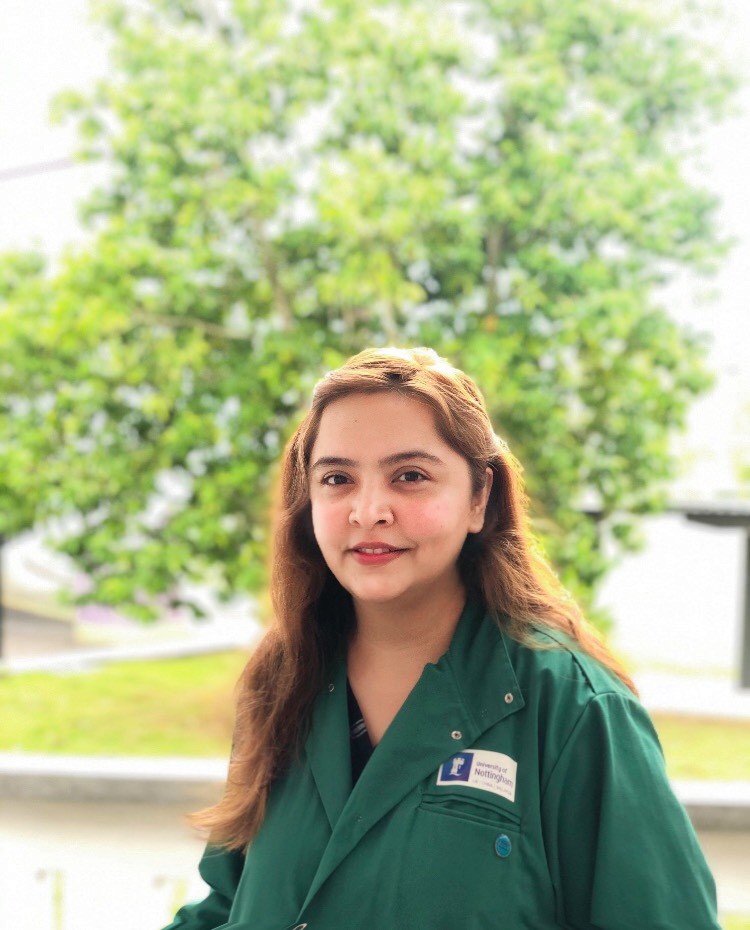
July 1, 2020, by Lexi Earl
Making sense of food waste: an interview with Hina Kamal
Hina Kamal is a PhD candidate with the Future Proteins project. Hina’s project is titled Food recycling: Utilising food waste for valuable proteins. Her supervisors are Prof Asgar Ali, Dr Le Cheng Fohm, and Dr Tim Parr. Hina’s research is focused on food waste recycling, in the context of understanding protein extraction methods, protein yield outcome, protein nutritional quality and utilization into product development. She joined the University in October 2019 from United Arab Emirates University (UAEU), where she was a Research Associate at the College of Food and Agriculture.
Why did you decide to do a PhD? What were you doing before?
The “challenge” of being an independent researcher is the sole reason I decided to do a PhD. Research has always been very appealing to me as a student. I completed my undergraduate studies BSc (2003-2006) and MSc (2006-2007) in Food Science & Technology from Karachi University, Pakistan with a GPA of 3.5 & 3.4 respectively. While studying I used to write articles for a local English newspaper, called “The Dawn”. The reason for stating this to highlight two facts: (a) a keen interest in the field of study other than the syllabus and (b) in the year 2009, I was offered my first job, as a Research Assistant at UAE University (UAEU) solely on the capability of researching and drafting.
During the 8+ years of research at UAEU, I co-authored 10 manuscripts and have been associated with multiple externally and internally funded research projects, focusing mainly on clinical studies, product development and studying the functional and bioactive peptides under the parasol of two departments – the Departments of Food Science and Nutrition. However, my crowning achievement was winning the “Alltech Young Scientist Award, USA”, where I was ranked 1st in UAE and 3rd in the Middle East/ Africa region.
Why did you choose this particular PhD project?
As a researcher and also as a student, I always wanted to pursue an area where the projects have the capacity to grow out from the laboratory setup into society and this project provides that opportunity.
How is your first year going? Any highlights or successes?
Currently, I have entered my 8th month of year one. The first four months were active in the collection of samples and in carrying out some initial experiments, along with attending the graduate school trainings. However, so far under the current circumstances (Covid-19), I have been focussing on writing reviews. In fact, one review on “protein extraction and utilization-current status and opportunities” has already been submitted to Comprehensive review of Food Science and Food Safety. Another review studying the cavitation technique has been submitted to my supervisor for review.

Has undertaking a PhD been different from other degrees you have done? How so?
Pursuing a PhD is a completely different phase. It requires one to multitask and often be proactive. On multiple occasions many tasks are important and of high priority, hence one simply does not learn just how to be an effective researcher, but it is a self development course too.
What have you learnt through your first PhD year?
I would say self-belief. Even though it is still the initial year, there have been many occasions starting from procurement to actual pragmatic laboratory experiments, where I have fought battles of ‘why’ or ‘how’ in my head. The need and importance of the work becomes effective if one relies on self-perseverance and belief.
Tell us about your research. What do you study? Why is it important?
The main objective of this project is food recycling as the future food. It provides an in-depth knowledge of different extraction methods and efficiencies for the recovery of protein from food waste. In my opinion while food waste is not a new concept, increasing concerns about chronic hunger, nutritional deficiency, food security and sustainability have intensified attention to alternative and sustainable sources of protein for food and feed. Initiatives to extract and utilize protein from food waste on a commercial scale have been undertaken, mainly in the developed countries, but they remain largely underutilized and generally suited for low quality products. Focusing on nutritional quality, yield and functionality of the isolated protein as a valued recycled ingredient is indeed very engaging to me as a researcher.
How do you explain your research to ordinary people?
Luckily, my objective is not that alien to the ears of the society. So I usually find myself having an interesting conversation. Usually I try to educate them about the concepts of reducing food waste, this includes: buying less fresh produce, storage conditions of food, buying the ugly vegetables etc. Most people have the concept of converting food waste to compost, so when I highlight the idea of reutilization of food waste fit for human consumption that can be marketed in many products as a functional ingredient for both small and big scale business, they are rather excited.
How do you cope with the pressure of doing a PhD?
As an international student, initially it was different, but not difficult to cope with pressure of doing a PhD. I find cooking therapeutic and I do enjoy learning different cuisines.
No comments yet, fill out a comment to be the first

Leave a Reply